Compared: Galaxy Tab S6 versus iPad Pro with Magic Keyboard
Apple's new Magic Keyboard for the 2020 iPad Pro may make the tablet seem like an ideal portable workstation, but how does it stack up against the Samsung Galaxy Tab S6?
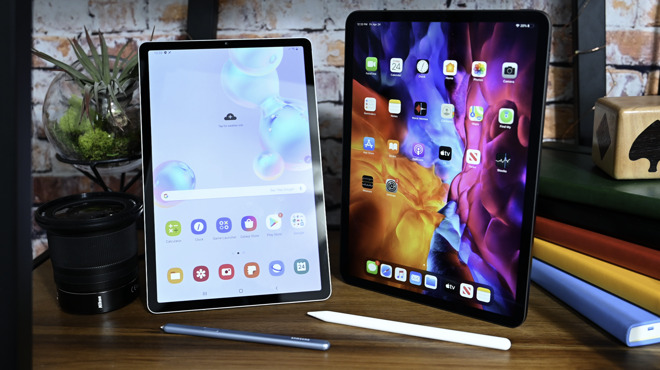
The Galaxy Tab S6 and iPad Pro 11-inch (2020)
Shortly after the launch of the iPad, Apple's tablet has been a consideration for those wanting a portable way to work. With the introduction of the iPad Pro lineup, Apple positioned the tablet closer to what power users would typically need in terms of features and performance.
For the latest release, the new Magic Keyboard that makes the iPad Pro float above the keys has caught many people's attention, framing it as a viable alternative to the traditional notebook.
Apple is far from the only tablet producer around, with long-time rival Samsung having a considerable number of them in its product catalog. It only makes sense for people rethinking their use of a notebook to also consider other alternatives, and as Samsung's Galaxy Tab S6 also has a keyboard cover accessory, they target similar markets.
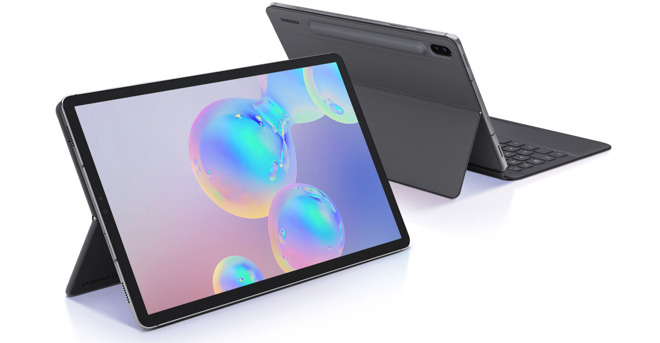
Samsung Galaxy Tab S6
Samsung also wins in terms of weight, with its 420-gram tablet being relatively light against the 11-inch's 471-gram mass and the heavyweight 641-gram 12.9-inch model.
Despite the size, Samsung also leads in resolution, squeezing a 2,560 by 1,600-pixel picture onto its Super AMOLED screen, giving it a pixel density of 287pixels per inch. The Liquid Retina displays of the 11-inch and 12.9-inch can't keep up at 264ppi apiece, but the 12.9-inch's larger size allows for an overall higher-resolution image, measuring 2,732 pixels by 2,048.
By comparison, the Qualcomm Snapdragon 855 used in the Galaxy Tab S6 musters scores of 713 on single-core and 2,460 on multi-core tests. Apple's processor is ultimately much faster overall than the chip used in Samsung's tablet, with it ultimately being no contest.
On the iPad Pro side, Apple slots between the two extremes of Samsung's sensors, with a 12-megapixel Wide and 10-megapixel Ultra Wide pairing. Also on the back is a LiDAR sensor which provides depth-sensing capabilities, something that could help both with standard photography and with augmented reality applications.
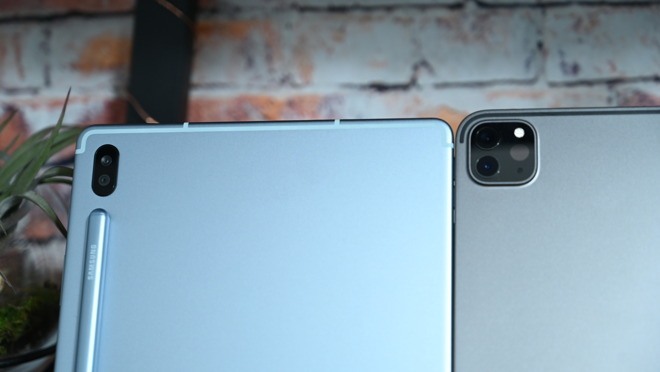
Dual-camera setups on iPad Pro and Galaxy Tab S6
To the front of the devices, it is a mixed bag. Samsung has opted for a fairly standard 8-megapixel camera, whereas Apple uses the 7-megapixel TrueDepth camera array. While Apple's solution is lower resolution, it also powers Face ID and can take advantage of the facial mapping in other ways that Samsung's tablet simply cannot.
For video, they are evenly matched, with both capable of capturing 4K video.
Audio is also similarly matched with both using four speakers, though Samsung elects to include Dolby Atmos support and AKG tuning.
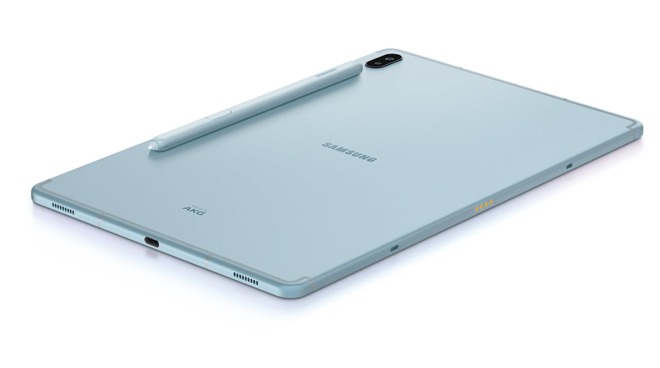
Samsung Galaxy Tab S6
The Galaxy Tab S6 has a 7,040mAh battery, and the iPad Pros have 28.65-watt-hour and 36.71-watt-hour batteries. Due to the variance of real-world usage, it isn't easy to quantify which is better short of putting them against each other in a battery of tests, but either will still provide quite a few hours of battery life per charge.
Though lacking Face ID's security, Samsung does offer authentication in a number of ways, including pattern, PIN, and password locks. On the biometric side, there is face recognition, albeit without Face ID's accuracy, as well as an on-screen optical fingerprint sensor.
Apple offers four storage options, ranging from 128GB all the way up to 1TB. Samsung only offers two storage options, in the form of 128GB or 256GB of internal storage, but Samsung also offers the opportunity to add up to a terabyte more using microSD.
The iPad Pro starts from $799 for the 11-inch model, rising to $999 for the 12.9-inch version. Moving from 128GB to 256GB will cost an extra $100 regardless of size, while going up to 1 terabyte of storage adds $500 to the base cost. Adding cellular access costs an extra $250 on top.
On Apple's side is the much-touted Magic Keyboard, which offers a scissor mechanism, full-size backlit keys, a built-in trackpad, and a floating cantilever design. It is also the more unusual keyboard accessory designs, and that reflects in the price at $299 or $349, depending on the size of the corresponding iPad Pro.
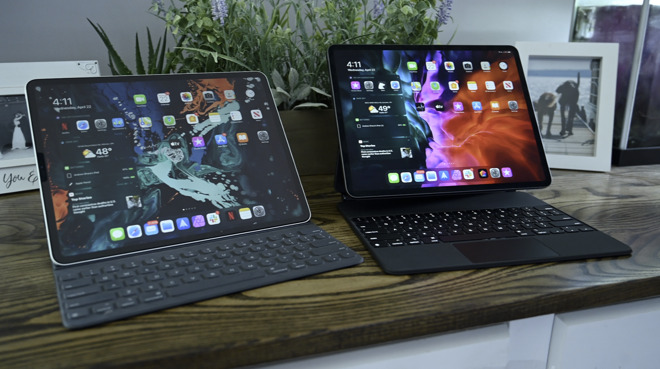
Apple's Smart Keyboard Folio and Magic Keyboard
The more conventional Smart Keyboard Folio is a fold-out keyboard that the iPad Pro rests upon once deployed in one of two viewing angles, and has the older non-scissor mechanism. The Smart Keyboard Folio is a more wallet-friendly $179 or $199, again varying on size, making the switch up to a better keyboard mechanism and the floating capability a $100 or $130 upgrade.
Some users may elect to acquire a Smart Keyboard Folio, and use the savings to buy an Apple Pencil. They may also feel the trackpad isn't a great addition, seeing as the iPad Pro uses a touchscreen and there's also the Apple Pencil available to use.
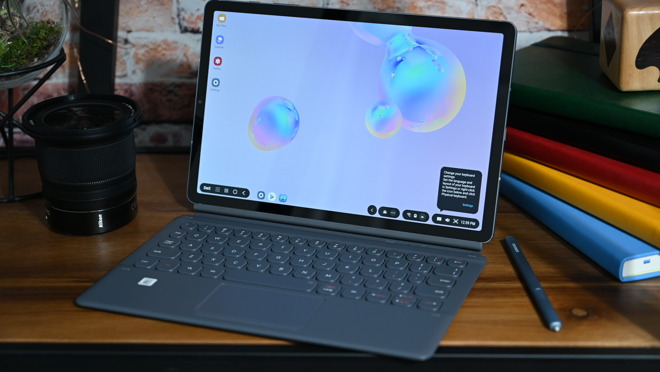
BookCover for Tab S6
On Samsung's side is the BookCover Keyboard. Attaching by magnets, the BookCover Keyboard offers a flip-out kickstand and a keyboard that seems to be similar to Apple's Smart Keyboard Folio. Again, it is sold separately, priced at $199.
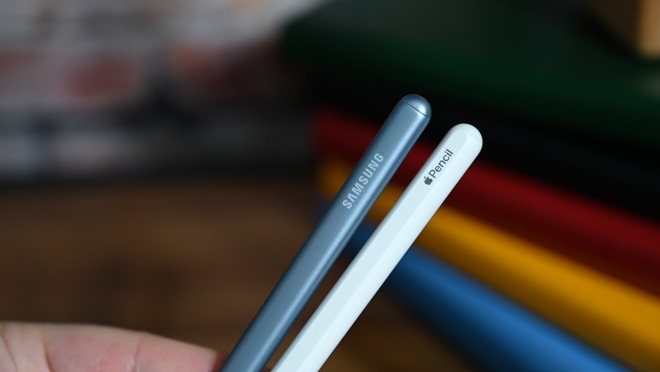
S-Pen and Apple Pencil 2
Samsung does score points, however, by providing the S-Pen with the tablet. Apple requires users to buy the second-generation Apple Pencil separately, at an extra $129.
Apple undeniably has the most powerful tablet of the group, with Samsung not coming close in terms of performance. It's also the more visually appealing, with the floating effect of the Magic Keyboard certainly capable of catching the eye of passers-by.
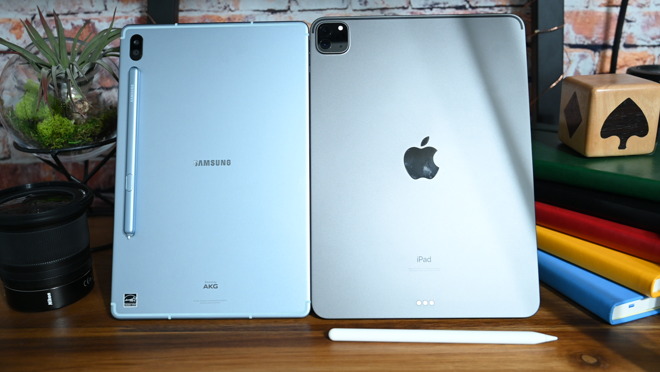
iPad Pro (2020) and Galaxy Tab S6
For the Galaxy Tab S6, it is potentially more expandable with the use of microSD, and is slightly smaller and lighter than its rivals. Samsung also benefits here from Apple's premium pricing strategy, with its offering being $150 cheaper at the base specification, as well as throwing in the S-Pen stylus without asking for more money.
If processing power isn't an issue, Samsung's discounted price compared to Apple's may make a big difference too. But, as tablets aren't on the same replacement cycle that mobile phones are, it makes more sense to get more power now, instead of skimping.
And, in regards to those keyboards, do you really need a keyboard that makes your iPad float? If you can justify the expense enough with the wider angle selection, a trackpad, and a better keyboard mechanism than most keyboard accessories on the market today, then Apple's Magic Keyboard is the way to go.
For most people with the available funds, the iPad Pro is arguably the better deal. While more expensive up-front, the sheer performance and the high likelihood it will be used for years longer than Samsung's effort makes Apple's higher price tag worthwhile.
Those interested in the iPad Pro can save up to $70 instantly on the 2020 models, with the best deals at your fingertips in the AppleInsider 2020 11-inch iPad Pro Price Guide and 2020 12.9-inch iPad Pro Price Guide.

The Galaxy Tab S6 and iPad Pro 11-inch (2020)
Shortly after the launch of the iPad, Apple's tablet has been a consideration for those wanting a portable way to work. With the introduction of the iPad Pro lineup, Apple positioned the tablet closer to what power users would typically need in terms of features and performance.
For the latest release, the new Magic Keyboard that makes the iPad Pro float above the keys has caught many people's attention, framing it as a viable alternative to the traditional notebook.
Apple is far from the only tablet producer around, with long-time rival Samsung having a considerable number of them in its product catalog. It only makes sense for people rethinking their use of a notebook to also consider other alternatives, and as Samsung's Galaxy Tab S6 also has a keyboard cover accessory, they target similar markets.
| Samsung Galaxy Tab S6 | Apple iPad Pro (2020) | |
|---|---|---|
| Price | From $649.99 Now on sale | From $799 (11-inch), $999 (12.9-inch) Lowest iPad prices |
| Display | 10.5-inch 1,600x2,560 Super AMOLED (287ppi) | 11-inch 2,388x1,688 Liquid Retina (264ppi), 12.9-inch 2,732x2,048 Liquid Retina (264ppi) |
| Dimensions | 244.5 x 159.5 x 5.7mm | 247.6 x 178.5 x 5.9mm, 280.6 x 214.9 x 5.9mm |
| Weight | 420g | 471g, 641g |
| Processor | Qualcomm Snapdragon 855 | A12Z Bionic |
| Storage | 128GB, 256GB, microSD to 1TB | 128GB, 256GB, 512GB, 1TB |
| Rear Cameras | Wide and Ultra Wide 13MP, 5MP | Wide 12MP, Ultra Wide 10MP, LiDAR |
| Front Cameras | 8MP | 7MP TrueDepth Camera |
| Video Shooting | Up to 4K | Up to 4K at 24, 30, 60FPS |
| Connectivity | Dual-band Wi-Fi 802.11ac, Bluetooth 5.0, LTE Cat 20 | Dual-band Wi-Fi 6 802.11ax, Bluetooth 5.0, LTE |
| Audio | Four Dolby Atmos AKG-tuned speakers | Four speakers |
| Battery | 7,040mAh | 28.65-watt-hour, 36.71-watt-hour |
Galaxy Tab S6 versus iPad Pro - Size and Screen
If we are talking just dimensions alone, Samsung has the smallest model of the trio being compared, with its 10.5-inch screen overshadowed by the 11-inch and 12.9-inch versions used by the iPad Pro. This is also true for the width, length, and thickness, with Samsung being the smallest and slimmest, measuring 5.7mm thick compared to the iPad Pro's 5.9mm thickness.
Samsung Galaxy Tab S6
Samsung also wins in terms of weight, with its 420-gram tablet being relatively light against the 11-inch's 471-gram mass and the heavyweight 641-gram 12.9-inch model.
Despite the size, Samsung also leads in resolution, squeezing a 2,560 by 1,600-pixel picture onto its Super AMOLED screen, giving it a pixel density of 287pixels per inch. The Liquid Retina displays of the 11-inch and 12.9-inch can't keep up at 264ppi apiece, but the 12.9-inch's larger size allows for an overall higher-resolution image, measuring 2,732 pixels by 2,048.
Galaxy Tab S6 versus iPad Pro - Performance
The 2020 iPad Pro has a somewhat faster chip than the previous generation, though the A12Z Bionic system-on-chip is a re-binned A12X from 2018. Under Geekbench, it achieved a single-core benchmark of 1,117 and 4,690 on multi-core testing.By comparison, the Qualcomm Snapdragon 855 used in the Galaxy Tab S6 musters scores of 713 on single-core and 2,460 on multi-core tests. Apple's processor is ultimately much faster overall than the chip used in Samsung's tablet, with it ultimately being no contest.
Galaxy Tab S6 versus iPad Pro - Cameras
Both Samsung and Apple have included quite good cameras on the back of their respective products. The Samsung has a dual-camera array consisting of 13-megapixel and 5-megapixel sensors paired with Wide and Ultra Wide lenses, which will do for most applications.On the iPad Pro side, Apple slots between the two extremes of Samsung's sensors, with a 12-megapixel Wide and 10-megapixel Ultra Wide pairing. Also on the back is a LiDAR sensor which provides depth-sensing capabilities, something that could help both with standard photography and with augmented reality applications.

Dual-camera setups on iPad Pro and Galaxy Tab S6
To the front of the devices, it is a mixed bag. Samsung has opted for a fairly standard 8-megapixel camera, whereas Apple uses the 7-megapixel TrueDepth camera array. While Apple's solution is lower resolution, it also powers Face ID and can take advantage of the facial mapping in other ways that Samsung's tablet simply cannot.
For video, they are evenly matched, with both capable of capturing 4K video.
Other Specifications
Both offer amble connectivity options, including dual-band Wi-Fi support, though Apple supports Wi-Fi 6 802.11ax while Samsung uses 802.11ac. Both use Bluetooth 5.0 and offer LTE connectivity as an add-on.Audio is also similarly matched with both using four speakers, though Samsung elects to include Dolby Atmos support and AKG tuning.

Samsung Galaxy Tab S6
The Galaxy Tab S6 has a 7,040mAh battery, and the iPad Pros have 28.65-watt-hour and 36.71-watt-hour batteries. Due to the variance of real-world usage, it isn't easy to quantify which is better short of putting them against each other in a battery of tests, but either will still provide quite a few hours of battery life per charge.
Though lacking Face ID's security, Samsung does offer authentication in a number of ways, including pattern, PIN, and password locks. On the biometric side, there is face recognition, albeit without Face ID's accuracy, as well as an on-screen optical fingerprint sensor.
Apple offers four storage options, ranging from 128GB all the way up to 1TB. Samsung only offers two storage options, in the form of 128GB or 256GB of internal storage, but Samsung also offers the opportunity to add up to a terabyte more using microSD.
Galaxy Tab S6 versus iPad Pro - Pricing
For the tablet alone, Samsung is starting its Galaxy Tab S6 from $649.99 for the 128GB model, or $80 more at $729.99 for the 256GB version, excluding LTE.The iPad Pro starts from $799 for the 11-inch model, rising to $999 for the 12.9-inch version. Moving from 128GB to 256GB will cost an extra $100 regardless of size, while going up to 1 terabyte of storage adds $500 to the base cost. Adding cellular access costs an extra $250 on top.
A Word on Keyboards and Touch
Both Apple and Samsung have a variety of keyboard accessories available that work with their respective tablets.On Apple's side is the much-touted Magic Keyboard, which offers a scissor mechanism, full-size backlit keys, a built-in trackpad, and a floating cantilever design. It is also the more unusual keyboard accessory designs, and that reflects in the price at $299 or $349, depending on the size of the corresponding iPad Pro.

Apple's Smart Keyboard Folio and Magic Keyboard
The more conventional Smart Keyboard Folio is a fold-out keyboard that the iPad Pro rests upon once deployed in one of two viewing angles, and has the older non-scissor mechanism. The Smart Keyboard Folio is a more wallet-friendly $179 or $199, again varying on size, making the switch up to a better keyboard mechanism and the floating capability a $100 or $130 upgrade.
Some users may elect to acquire a Smart Keyboard Folio, and use the savings to buy an Apple Pencil. They may also feel the trackpad isn't a great addition, seeing as the iPad Pro uses a touchscreen and there's also the Apple Pencil available to use.

BookCover for Tab S6
On Samsung's side is the BookCover Keyboard. Attaching by magnets, the BookCover Keyboard offers a flip-out kickstand and a keyboard that seems to be similar to Apple's Smart Keyboard Folio. Again, it is sold separately, priced at $199.

S-Pen and Apple Pencil 2
Samsung does score points, however, by providing the S-Pen with the tablet. Apple requires users to buy the second-generation Apple Pencil separately, at an extra $129.
Apple versus Samsung's tablet philosophy takes center-stage
This specification comparison shows a few things about Apple and Samsung and their approaches to tablet design and pricing.Apple undeniably has the most powerful tablet of the group, with Samsung not coming close in terms of performance. It's also the more visually appealing, with the floating effect of the Magic Keyboard certainly capable of catching the eye of passers-by.

iPad Pro (2020) and Galaxy Tab S6
For the Galaxy Tab S6, it is potentially more expandable with the use of microSD, and is slightly smaller and lighter than its rivals. Samsung also benefits here from Apple's premium pricing strategy, with its offering being $150 cheaper at the base specification, as well as throwing in the S-Pen stylus without asking for more money.
If processing power isn't an issue, Samsung's discounted price compared to Apple's may make a big difference too. But, as tablets aren't on the same replacement cycle that mobile phones are, it makes more sense to get more power now, instead of skimping.
And, in regards to those keyboards, do you really need a keyboard that makes your iPad float? If you can justify the expense enough with the wider angle selection, a trackpad, and a better keyboard mechanism than most keyboard accessories on the market today, then Apple's Magic Keyboard is the way to go.
For most people with the available funds, the iPad Pro is arguably the better deal. While more expensive up-front, the sheer performance and the high likelihood it will be used for years longer than Samsung's effort makes Apple's higher price tag worthwhile.
Where to buy
The Samsung Galaxy Tab S6 is on sale at Samsung starting at $549.99. Shoppers can also pick up the 256GB version at Amazon after a triple-digit discount.Those interested in the iPad Pro can save up to $70 instantly on the 2020 models, with the best deals at your fingertips in the AppleInsider 2020 11-inch iPad Pro Price Guide and 2020 12.9-inch iPad Pro Price Guide.


Comments
Similar to the Surface Go 2 article (https://forums.appleinsider.com/discussion/comment/3238354), this article has also done very little to touch upon the actual use cases and ecosystem these devices offer.
At the end of the day, if you want a solid tablet for media consumption and very light workloads, get the iPad Pro.
If you want a tablet device for productivity in this size and form factor, get a Surface Go 2.
Don't get a Samsung Galaxy Tab S6.
IPads (all models) get at least four years (usually longer) of active upgrades, which IMO more than makes up the difference in price.
Maybe performance and price wise they should be compared against an iPad Air?
If you need to do coding, various file type conversions, CAD, run virtual machines, simulations, content creation, etc., both Android and iPadOS hit a brick wall with only half-baked or nonexistent solutions to those use cases.
You wrote:
"Apple's processor is ultimately much faster overall than the chip used in Samsung's tablet, with it ultimately being no contest."
What does the Geekbench scores tell at all? Nothing! Did you compare the real life performance? How can you say there is no contest? I don't need a high score in Geekbench if I can't do too much with it!
My daughters have a tab S4 and tab s6 as their personal computers.
They both run it on Dex mode which you even forgot to mention, Dex converts the tabs into real computers and they just run smoothly – no lags. They are not missing a single App from the Windows world.
They have real mouse and of course the SPen. And they can do thing that an iPad would not allow you to do such as real Desktop sharing, not to mention basics such as a file system.
So for what would I need a heavy Magic Keyboard if I don't have basic pro features?
And to all mentioning missing support: you have three years software update. Also the often criticized older Android version is simply not understood. You get Samsung’s own Android version which has features that Google might introduce years later or not. And iOS probably even later, if at all. So the Samsung OS that you would get in 3 years would have features that neither Android or iOS would have in 6 years.
If Samsung provided the latest stock Android version, I would never buy a Samsung because it would lack professional features.